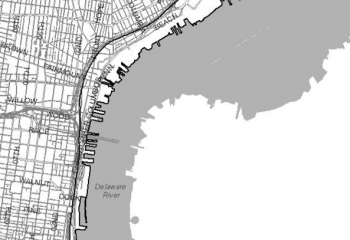Central Delaware Overlay legislation, which would codify city’s waterfront masterplan, is not introduced by city council “deadline.”

Zoning legislation creating the Central Delaware Waterfront Overlay was not introduced at Thursday’s city council meeting. So unless council adds an extra session, there can be no new overlay in place before summer break.
The overlay is designed to create an organized system for the principles of the Central Delaware Master Plan, the city’s long-term vision for the revitalization of the waterfront. The idea is that between the overlay and the underlying zoning, future development would fit in with the master plan. And conversely, development that did not fit in could not happen – at least not without a zoning variance or special ordinance.
“There are still some questions,” First District City Councilman Mark Squilla said when asked why the introduction didn’t happen. “If we add another session, we can squeeze it in. If not, it will have to wait till fall.”
Squilla has been talking to city planning and at least two groups of constituents about the overlay language – the Central Delaware Advocacy Group, which is comprised of representatives from various riverfront civic groups and organizations and advocates for the Master Plan, and the Development Workshop, a development advocacy groups which represents the views of landowners and developers. He said last week that he did not introduce the legislation at the May 17 session because these groups still had concerns about the latest draft, and Squilla wanted to meet with them again. He had hoped to introduce the bill Thursday.
CDAG members don’t think the draft does enough to protect several principles of the master plan, including waterfront access and the extension of the street grid. In fact, CDAG Chairman Matt Ruben said last week he wasn’t certain the draft would make much of a differences, versus not having one in place.
Last week, Development Workshop representatives said they were not ready to share their concerns with PlanPhilly. The Workshop could not be reached for comment today.
Council’s inability to pass the new zoning overlay before going on break would not necessarily mean that some overlay – either the existing, interim one, or a new one – would not be in effect, however.
City planners say that once the new city zoning code goes into effect Aug. 22, the interim overlay will no longer exist. Right now, there is a blank place holder in the new zoning code for a new overlay, so in effect, the planners say, there would be no overlay until a new one were in effect.
This is what waterfront advocates have feared.
But Squilla said that Deputy Planning Commission Executive Director Eva Gladstein told him that should it not be possible for the new overlay to pass through council before summer break, an amendment could be added to the pending zoning code clean-up bill (Zoning Bill 120431) to keep the interim protections in place until a new overlay is passed.
“It is still the councilman’s choice, but he could chose to try to introduce an amendment to other zoning bills in play,” Gladstein told PlanPhilly. Since that legislation has already been introduced, the required notice for a public hearing has been met, even if there is an amendment, Gladstein said.
Another zoning bill already introduced might also work, but not just any bill would, Gladstein said. “An amendment has to be in keeping with the title of the bill. It has to be consistent,” she said. That is why she is not entirely certain this approach would be technically achievable.
A new overlay could also impact development on the Central Delaware even if Council has not adopted it, Gladstein said, but Squilla would have to be comfortable enough to introduce the overlay legislation relatively soon. “If the Councilman chooses to introduce the new overlay, and it is voted out of Committee with a positive recommendation, it is considered a ‘pending ordinance’ that L&I must apply as if it is law,” Gladstein wrote in an email follow up to the interview. “Therefore, it is possible that there is enough time to get the bill out of Committee, and have it apply by August 22nd, even though it has not yet been finally approved by City Council.”
Should none of the scenarios keeping the old overlay in place, or putting the new one in effect, happen, Gladstein said there would not be much time without an overlay in effect. Legislation introduced before break is still in the system in the fall, so a hearing could be set quickly, and a vote taken as few as two council sessions later, she said. So could developers slip in a project that didn’t meet the goals of the Master Plan?
“Time wise, it would be a very small window,” she said. Gladstein also pointed out that for any large project, civic design review will be in place, as that is in the new code itself.
Reach the reporter at kgates@planphilly.com.
WHYY is your source for fact-based, in-depth journalism and information. As a nonprofit organization, we rely on financial support from readers like you. Please give today.



